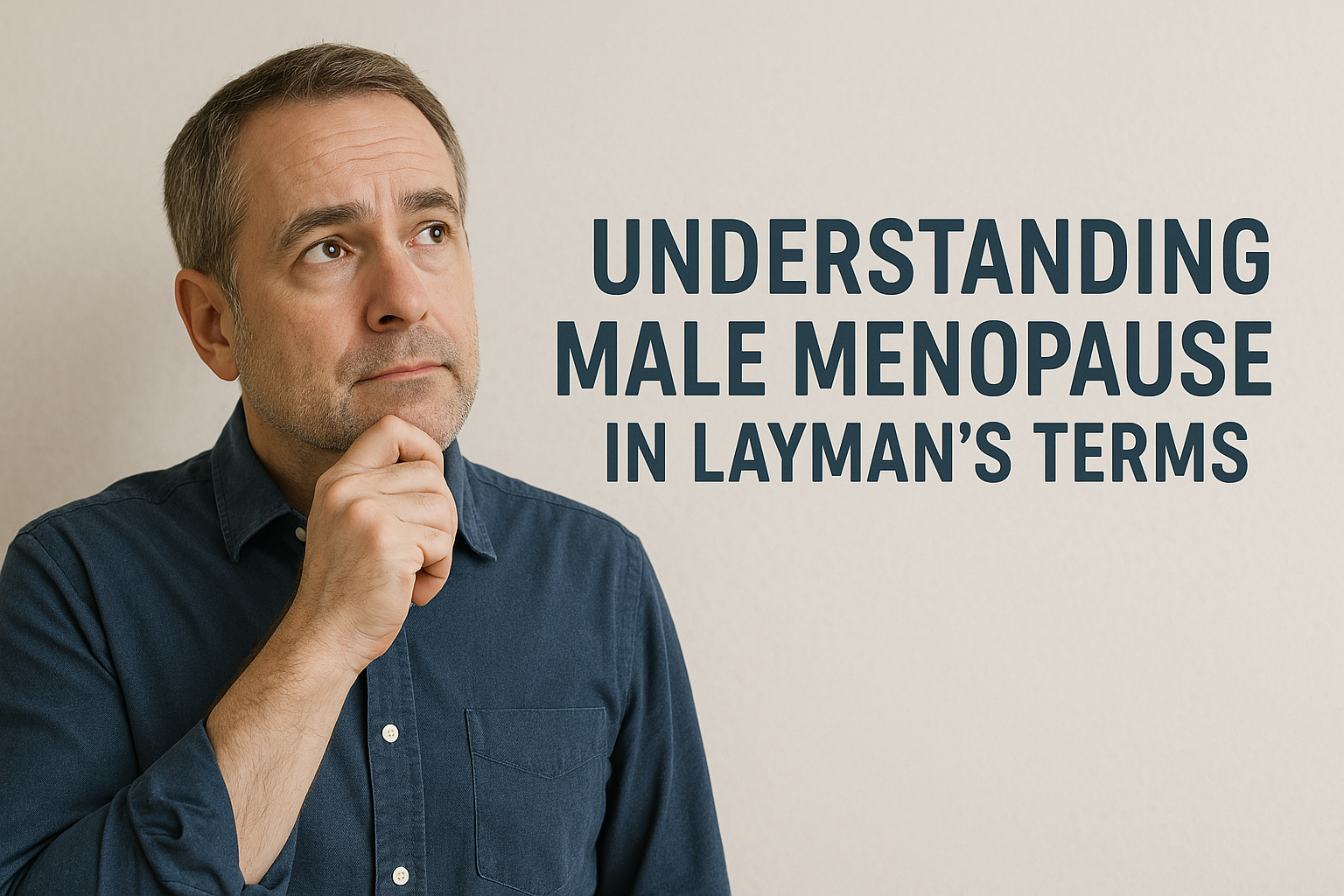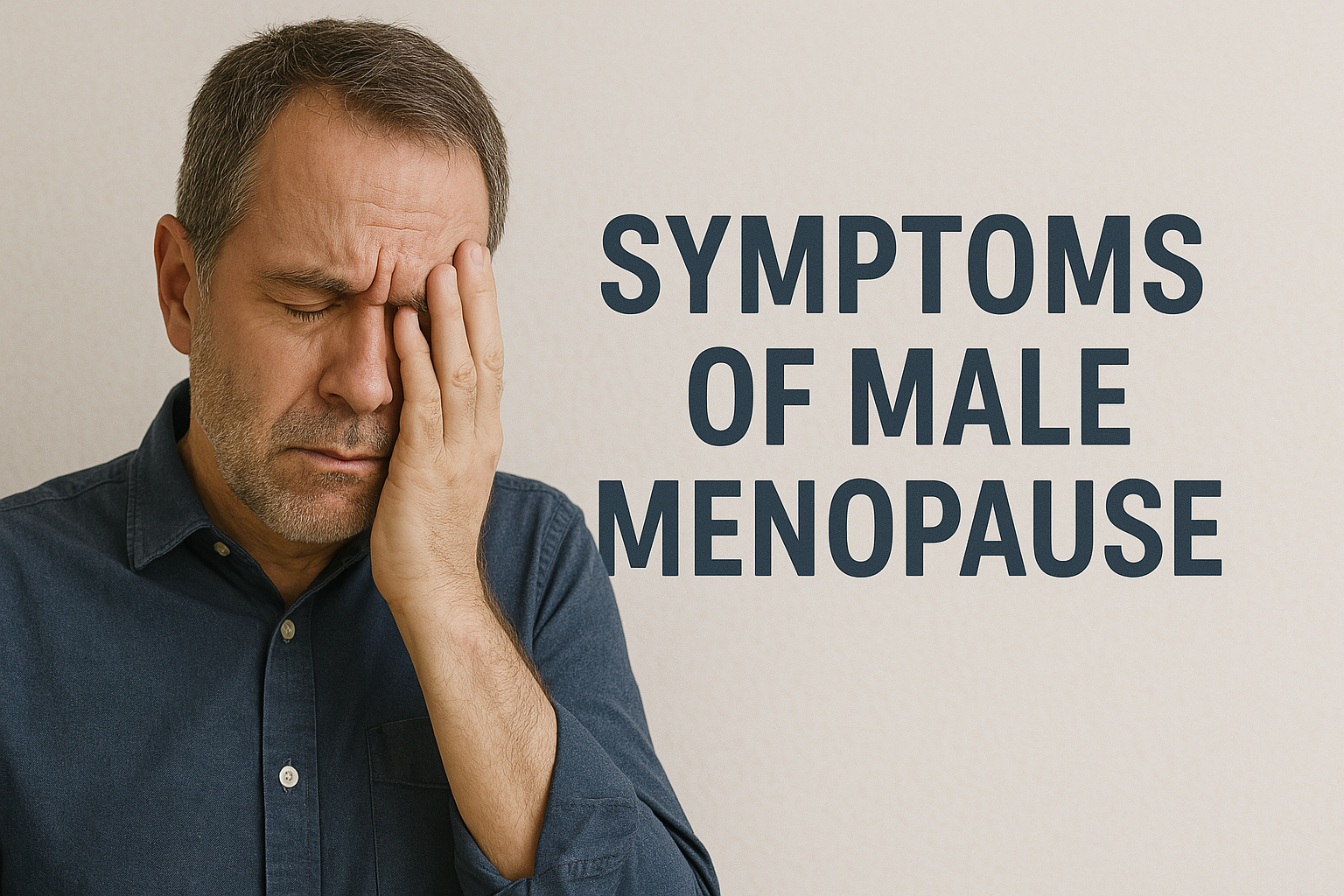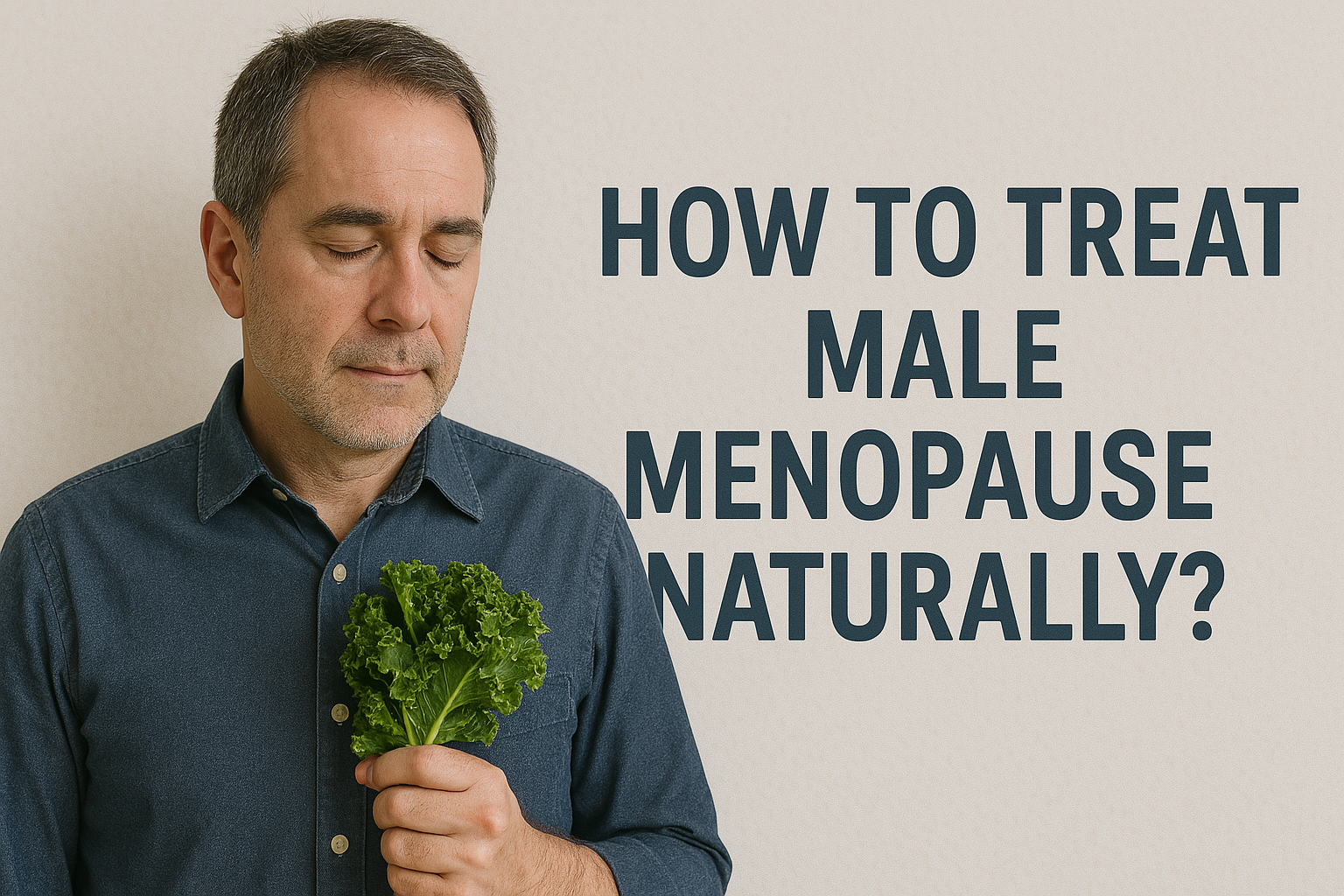“Menopause,” a term that describes the period when a woman’s menstruation stops and her reproductive organs have fully ceased functioning. This means that after menopause, she will no longer be able to get pregnant. But what if I told you there’s a strange phenomenon circulating all over the internet named “Male Menopause”?
Surprising, right? If you’re wondering: “What is male menopause?” and whether it’s true or just another misleading term, then there’s no need to worry. This article provides a clear explanation of male menopause, the symptoms of male menopause, and effective ways to treat it naturally.
Note: This article from TheFitInside is for informational purposes only and not meant to spread any misleading concepts. The information given in this article is from studies and internet sources, and the goal is to present the information in simple, easy-to-understand terms.

Understanding Male Menopause In Layman’s Terms
As humans, we all have to go through the inevitable process of “aging.” And with aging, we also face some of the health challenges that come along with time. One such condition is menopause, which marks the point when a woman can no longer reproduce. But hearing the same about the “him” species might raise some eyebrows. So, let’s break down the term: “What is male menopause?” Well, in scientific journals and literature, such a condition is known as “andropause.”
Unlike menopause in women, the less-discussed “andropause” is a different phenomenon. It doesn’t occur suddenly like it does in women; instead, it starts with a few signs and gradually progresses. One of the main differences is that a man’s sexual function doesn’t wholly cease, even if he is experiencing this condition. But once women reach menopause, their ovaries stop producing eggs. If you’re a man who’s in his 50s or 60s, you’re either already experiencing it or about to. This primarily occurs when a man’s testosterone levels begin to decline.
Although many men dismiss the symptoms of male menopause, considering them as “just aging,” but andropause, aka male menopause, is a real condition. The decline in testosterone can impact physical, mental, and emotional health, often leading to symptoms that can disrupt daily life.
This condition can lower libido and affect energy levels, mood, muscle mass, and overall well-being. Now, let’s understand what the symptoms are in detail and whether there are any preventive measures for this.

Common Symptoms of Male Menopause
Males who face the symptoms of male menopause (andropause) are generally older in age. Here is a list of a few signs and symptoms that indicate male menopause:
Loss of Muscle Mass
As men age and reach their 40s, it’s common to notice a gradual decrease in muscle mass. This is one of the major symptoms of male menopause. In fact, research from the National Library of Medicine, National Center for Biotechnology Information (NIH) shows that muscle loss, also called “sarcopenia,” typically starts around age 30, with a steady decline of about 3-8% per decade. This happens primarily due to a drop in testosterone, the hormone that plays a crucial role in building muscle and supporting overall male health.
The good news, however, is that maintaining muscle mass is still very much possible. With a well-balanced diet that includes plenty of protein and regular strength training exercises, men can slow down or even counteract this natural process.
Fat Gain
When testosterone levels decline, the gradual process of fat distribution increases. This also happens because, as we age, our metabolism tends to slow down, which leads to an increase in fat. According to Healthline, the increase in fat—particularly around the abdominal area, can be both a sign and an effect of male menopause. An enzyme found in your fat tissues transforms testosterone into estrogen, which, as a result, further reduces testosterone levels. So, if you’ve started gaining weight or find yourself struggling with your weight, it might be a good idea to get a blood test to check your testosterone levels.
Low Sex Performance
As testosterone levels decline with age, men experience a decrease in libido (the hormone that drives sexual desire). It’s also one of the most common symptoms of male menopause. However, it’s important to note that testosterone is not the sole factor that influences libido—age plays a massive role, along with other contributing factors such as stress, lifestyle choices, and overall health. One noticeable sign of lowered testosterone is the reduction in morning erections, which are typically a good indicator of healthy testosterone levels.
As a result, men may find that they don’t feel as energetic or engaged during sexual activities as they once did. This decline can be a major concern for men, impacting both physical and mental well-being.
Weakened Immunity
Testosterone plays a major role in how your immune system functions, as they are responsible for the formation of various immune cells in the body. For example, it helps produce T-cells, which are essential for fighting infections. A deficiency in testosterone makes these cells less effective, leaving the body more vulnerable to infections. Hormonal changes, such as low testosterone levels, also affect the body’s inflammatory response.
This means that when testosterone is low, the body’s ability to manage inflammation is also compromised. To help maintain healthy testosterone levels (300 to 1000 nanograms per deciliter, ng/dL), it’s important to maintain a balanced diet with adequate protein intake and engage in regular exercise to keep your body active.
Decreased Bone Density
Another major “con” of low testosterone levels is decreased bone density, which is scientifically referred to as “osteoporosis.” It is a common concern for the elderly population. This means that your bones become more prone to fractures, pain, and minor breaks. Bone density decreases due to low sex hormones, one of them being testosterone. A study published in the Journal of Orthopaedic Surgery and Research sheds light on this, explaining that 199 men with low bone density had lower testosterone levels, which contributed to their bone density loss.
So what can you do to fix this? The answer is simple: get enough sunlight (Vitamin D), eat calcium-rich foods, hit your daily protein requirements, and exercise regularly.
Insomnia
When your testosterone levels decrease, your body increases cortisol levels (the stress hormone). The high cortisol levels can lead to stress, anxiety, and discomfort, leaving you sleep-deprived. Male menopause and lower testosterone levels can also disrupt circadian rhythm, which makes it harder to get a good night’s sleep.
So, what can you do to improve your sleep? The answer is simple: avoid blue light from phones or laptops before bed, exercise at least 3 hours before bedtime, and avoid heavy meals late at night—opt for a lite meal instead. However, if you’re still struggling with sleep, it’s a good idea to get a testosterone checkup or consult a doctor, as persistent sleep issues could be a sign of male menopause.
Also Read: Symptoms of Low Testosterone in Young Males!
Changes In Body Odor
Testosterone has a huge link with how our body odor changes. In simple words, when males go through the phase of male menopause and their testosterone levels drop, the apocrine gland (one of the glands responsible for body odor) experiences changes in activity. While it doesn’t mess up—the shift in hormone levels can alter sweat composition, which affects how the bacteria in our sweat break it down. This, combined with metabolic changes, can sometimes lead to noticeable differences in body odor.
The rest of the reasons can be—increased cortisol levels, metabolic decline, altering of pheromones, and sebum production. To fix this, you need to eat testosterone-boosting foods and exercise regularly. For hygiene, you can opt for an anti-bacterial soap, trim your groin hair, and wear breathable clothes.
Mood Swings & Lower Motivation
There’s no secret to it—testosterone is a hormone that also takes care of feel-good chemicals like endorphins, dopamine, and serotonin. Men with high T-levels generally have higher self-esteem, more motivation, and deal with fewer mood swings. Psychology Today breaks it down beautifully—when testosterone levels are healthy, people tend to be more competitive and assertive.
But when T-levels tank, stress hormones shoot up. Testosterone and cortisol (the stress hormone) have an inverse relationship, meaning when one goes up, the other goes down. That’s why guys going through male menopause often struggle with mood swings and a dip in motivation.
Reduced Sperm Quality
At this point, when you enter your late 40s, your ability to conceive a child also declines. However, this doesn’t mean you can’t become a father in your 40s or 50s. Unlike menopause in women, male menopause (andropause) only affects sperm quality and factors like low libido and an increased risk of damaged sperm.
Behind this is a simple scientific fact: the DNA in your sperm starts to deteriorate with age, stress, and declining testosterone levels. As a result, damaged sperm can increase the chances of miscarriage if pregnancy occurs.
Hair Thinning
Another major drawback of male menopause is that hair starts to thin. As you reach middle age and your testosterone levels drop, your body produces more of a hormone called DHT (dihydrotestosterone). DHT is responsible for hair thinning because as its levels rise, it begins to shrink and reduce hair follicles. So, what can you do? Eat foods that help block DHT. Redcliffe Labs has an article covering 20 foods that can reduce DHT—be sure to check it out to minimize hair loss.
However, DHT alone is not the only cause of hair thinning during male menopause. You might wonder, what are the other factors? Well, there are many. For example, increased cortisol levels (the stress hormone) can contribute to hair loss, and a poor diet can make it even worse.
Memory Loss
We all often get irritated when our grandparents forget certain things or even our names in a few instances. This happens because, as humans reach a certain age, the cognitive function of their body starts to decline. In scientific terms, this condition is known as dementia. Dementia is a condition in which a person starts to lose their memory, has trouble recalling things, and experiences overall cognitive decline. There are several types of dementia; however, that is a topic for another article.
Dementia occurs due to damage to brain cells. One of the contributing factors is the decline in sex hormones—testosterone in males and estrogen in females. It is more common in females; however, it also affects a huge number of men.
Also Read: Best Dietary Supplements for Men!
Getting Fatigue Often
When male menopause hits, every symptom mentioned earlier combines to drain your energy and make your body less responsive. The main culprit is a drop in testosterone levels, which significantly contributes to issues like poor metabolism, weakened immunity, and mood swings. These factors collectively lead to constant exhaustion.
Additionally, increased body fat and insomnia worsen the problem, as lack of sleep and an unhealthy body shape leave you feeling fatigued throughout the day. So, what’s the solution? Regular exercise, a balanced diet, and quality sleep are essential for combating these effects and restoring your energy.
So, the next time a question like “What is male menopause?” pops into your head, just remember these signs to identify. However, there are many other signs and symptoms of male menopause, some of which are similar to those in women, such as hot flashes, night sweats, irritability, and more. The good news is that men can slow down this process—by maintaining a healthy diet and adopting better lifestyle habits, they can gradually reduce its effects and boost overall well-being.

How To Treat Male Menopause Naturally?
By now, you’re probably getting a bunch of questions in your head about male menopause, like: How to treat male menopause naturally? Is there a way to slow it down? and more. Well, the good news is that with a balanced diet, regular exercise, and a healthy lifestyle, any man can slow it down and prevent many symptoms, as long as he isn’t dealing with any preexisting conditions or diseases. Staying fit throughout the year, keeping up with regular workouts, and avoiding habits like smoking or drinking can be a huge plus in this.
Eating a clean, protein-rich diet keeps you fuller for longer since it has a high satiety index, meaning you won’t be munching on unnecessary snacks. This helps prevent excess fat storage in the body, and the high protein intake also gives your T-levels a natural boost. Adding good fats and complex carbs to your meals makes your diet even more balanced. Incorporate foods that are known to enhance testosterone production, such as whole eggs, oysters, lean meat, etc. Additionally, include green vegetables and seasonal fruits to complete your daily vitamin and mineral requirements.
Furthermore, you can also take herbs like Shilajit and Ashwagandha, which help boost your sex hormones and make you feel more energized. In the article “Best Dietary Supplements for Men” on TheFitInside, we talked about how these two herbs work as natural supplements to further increase testosterone. Additionally, if you’re a chain smoker or someone who drinks alcohol daily, you’re stunting your health and inviting male menopause. Cut these bad habits from your lifestyle completely and age like fine wine—without stressing about andropause.

Final Remarks!
The condition of andropause can’t be completely stopped—after all, we’re all going to age. But we can slow it down gradually by learning how to treat male menopause naturally, which includes healthy eating, exercising, and cutting out unhealthy habits.
There are many ways to tackle this, including hormone replacement therapies, steroids, and other medications. However, before deciding to start any of these treatments, it’s always best to consult a doctor. A doctor can help you determine whether it’s the symptoms of male menopause or another health problem causing the issues.
Recommend this article to anyone who could benefit from understanding the topic—what is male menopause. Also, don’t stress too much—aging is a natural part of life. But if you experience any symptoms, take a positive and proactive approach; it’s the perfect time to focus on your health and well-being.

